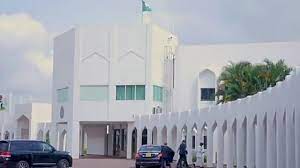Socio-Economic Rights and Accountability Project (SERAP) has urged President Bola Tinubu to use his good office to immediately reverse the unlawful ban on 25 journalists and media houses covering the presidential villa and subsequently restore their accreditations.
SERAP further urged him to instruct his aides at the presidential villa to allow journalists and media houses to freely do their job and discharge their constitutional duty of holding politicians accountable as well as setting an agenda for political office holders.
Recall that the Media Office at the Villa recently withdrew the accreditations of some 25 journalists and their respective media houses from covering activities at the Presidential Villa, Abuja. Some of the affected media houses include: Vanguard Newspaper; Galaxy TV; Ben TV; MITV; ITV Abuja; PromptNews; ONTV, and Liberty TV.
But the anti-graft body in a letter dated 26 August 2023 and signed by SERAP’s Deputy Director Kolawole Oluwadare, argued that barring these journalists and media houses covering the presidential villa, prevents them from carrying out their legitimate and constitutional responsibility.
SERAP expressed worry that the withdrawal of the accreditation of 25 journalists covering the presidential villa is a grave violation of the Nigerian Constitution and the country’s international human rights obligations.
SERAP explained that taking meaningful and effective steps to ensure respect for the rights to media freedom, access to information and citizens’ right to participate in their own government is a constitutional rights of citizens and an indictment on President Bola Ahmed Tinubu’s administration.
SERAP said, “Your administration cannot with one broad stroke ban journalists from covering public functions. Citizens’ access to information and participation would mean little if journalists and media houses are denied access to the seat of government.”
According to SERAP, “Media freedom is a cornerstone of Nigeria’s democracy and journalists must be able to hold the government to account. This is a matter of public interest. The government cannot cherry-pick journalists to cover its activities.”
SERAP explained that it would be grateful if the lifting of the ban is done within 48 hours of the receipt and/or publication of the letter. It added that if no feedback is received, it shall consider appropriate legal actions to compel the government to comply with the reversal in the public interest.
According to SERAP, “Nigerians may consider the expulsion of the journalists from the presidential villa as your government’s ambivalence towards media freedom, and citizens’ rights of access to information and participation in their own government.
“The legal obligations imposed on your government to ensure and uphold media freedom and human rights, and facilitate public access to the presidential villa as a public trust outweigh any purported ‘security concerns and overcrowding of the press gallery area.’
“Media freedom, access to information and citizens’ participation in the affairs of their own government are the sine qua non of a democratic and rule of law-based society.
“The withdrawal of the accreditation tags of these journalists directly violates media freedom and human rights including access to information and the right to participation. It would have a significant chilling effect on newsgathering and reporting functions, and may lead to self-censorship.
“The withdrawal of the accreditations of the journalists would construct barriers between Nigerians and certain information about the operations of their government, something which they have a constitutional right to receive.
“Media freedom, access to information and the right to participation are necessary for the maintenance of an open and accountable government. These freedoms are so fundamental in a democracy that they trump any vague grounds of ‘security concerns and overcrowding of the press gallery area.’
“The effective exercise of media freedom, access to information and citizens’ right to participation in their government would preserve and contribute to a free and democratic society, something which is consistent with your constitutional oath of office to defend the Nigerian Constitution 1999 [as amended].
“Allowing the media to cover the presidential villa would improve the reliability of information available to the public and serve the public interest.
“Your government reportedly justified this grave constitutional infraction on the pretext of ‘an internal attempt to reduce bloated number of print photographers and overcrowding in the State House.’
“Your government also cited alleged ‘security concerns raised by State House officials and visiting dignitaries concerning the overcrowding of the press gallery area that blocks the walking path to the President’s Office.’
“According to our information, your administration on 18 August 2023 withdrew the accreditation tags of some 25 journalists and media houses from covering activities at the Presidential Villa, Abuja.
“The banned journalists reportedly include those from Vanguard newspaper; Galaxy TV; Ben TV; MITV; ITV Abuja; PromptNews, ONTV, and Liberty. Other media personnel affected by the withdrawal are mostly reporters and cameramen from broadcast, print, and online media outlets.”
“The affected journalists were simply told at the main gate of the presidential villa to submit their accreditation tags.
Quoting relevant charter and Nigerian constitution to support its demand for reversals, it continued,
“Under section 22 of the Nigerian Constitution, the mass media including ‘the press, radio, television and other agencies of the mass media shall at all times be free to uphold the fundamental objectives contained in this Chapter and uphold the responsibility and accountability of the Government to the people.’
“Section 14(2)(c) of the Constitution provides that ‘the participation by the people in their government shall be ensured in accordance with the provisions of this Constitution.’
“Similarly, Article 9 of the African Charter on Human and Peoples’ Rights provides that, ‘Every individual shall have the right to receive information. Every individual shall have the right to express and disseminate his opinions.’
“Article 13 of the Charter also provides that, ‘Every citizen shall have the right to participate freely in the government of his country. Every citizen shall have the right of equal access to the public service of his country. Every individual shall have the right of access to public property and services.’
“Articles 19 and 25 of the International Covenant on Civil and Political Rights contain similar provisions”.
Techrectory with Agency Report



